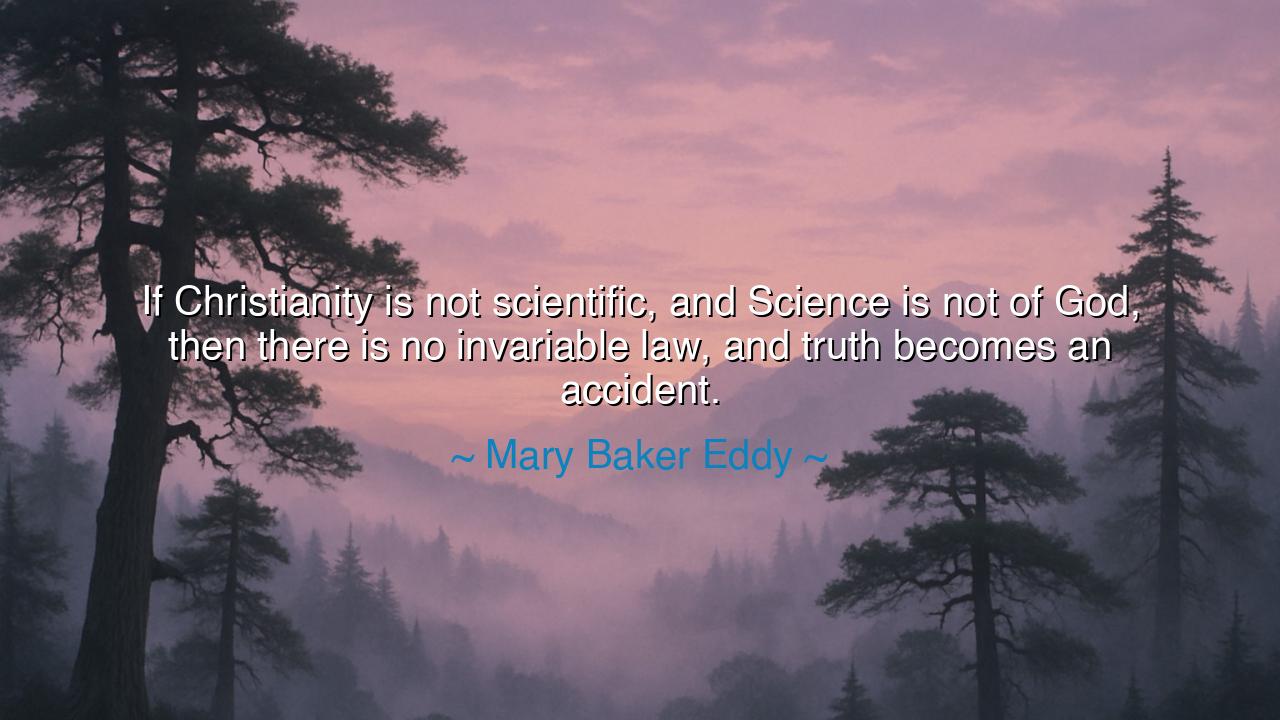
If Christianity is not scientific, and Science is not of God
If Christianity is not scientific, and Science is not of God, then there is no invariable law, and truth becomes an accident.






"If Christianity is not scientific, and Science is not of God, then there is no invariable law, and truth becomes an accident." These profound words by Mary Baker Eddy strike at the very core of human inquiry and belief. In this statement, Eddy presents a powerful vision: science and faith must not stand in opposition but must be united in their pursuit of truth. To her, if Christianity—the faith that guides so many hearts toward moral living—lacks a foundation in science, and if science—the search for understanding through reason—lacks a connection to God, then the very fabric of reality and truth is fractured. Without this harmony, truth becomes a random occurrence, an unpredictable event that is no longer bound by universal and invariable laws. The cosmos, in this view, would be nothing but chaos, driven by chance rather than governed by divine order.
In the ancient world, the great philosophers struggled with the same questions: what is truth? What is the nature of the universe? Can faith and reason coexist, or must they be enemies? Plato believed in an ideal world of forms, where perfect truth existed beyond the physical realm. His student, Aristotle, sought truth in the natural world, using logic and observation. While Plato emphasized the divine and metaphysical nature of truth, Aristotle anchored truth in the material world, believing that through reason and empirical study, humanity could uncover the laws of nature. In this ancient debate, Eddy’s quote provides an answer that calls for a synthesis: science and faith must meet in the middle, where reason and revelation coexist in the search for truth.
Consider the example of Isaac Newton, one of the greatest scientists to ever live, whose work on the laws of motion and gravity changed the course of human history. Newton, though deeply invested in science, did not see his work as separate from his faith. In fact, he believed that God created the universe with invariable laws, and it was through understanding these laws that humans could catch a glimpse of the divine order behind creation. To Newton, science was not a path to atheism or the rejection of God; rather, it was the means by which we could understand the intricate beauty of creation. He saw no contradiction between faith and science, for both were reflections of the same truth—the divine order of the universe.
In contrast, the Enlightenment thinkers, while bringing great advancements in science, often sought to separate reason from faith. Voltaire, Descartes, and others argued that science must be based on observable facts and reason, with no room for divine influence. This division between faith and reason created a rift that persists in some forms today. For those who view science as purely material, Eddy's words may seem radical. Yet, she calls for a reunion of the sacred and the empirical—a belief that the universe's laws are not random, but are the work of a divine creator, with science serving as the pathway to understanding these divine principles.
Eddy’s words invite us to see the connection between God and science, a relationship that is not accidental or purely material but divine and ordered. Without this connection, truth becomes fragmented, its power diminished. Truth, in this vision, is not something we stumble upon by chance or accident but is something that pervades the very fabric of reality. As Newton demonstrated, it is the study of nature—in its most precise, logical, and rational forms—that reveals the divine order of the universe. And just as faith provides a moral compass, so too does science guide us to understand the nature of that order.
The lesson we learn from Eddy’s wisdom is this: science and faith are not opposing forces but are complementary aspects of the same quest for truth. Without science, we risk being disconnected from the laws that govern nature and life. Without faith, we risk losing sight of the higher purpose that guides the cosmos. Together, they form a unified whole, where the search for truth in the natural world becomes a way of understanding God's creation, and faith becomes a framework for understanding how we should live within that creation.
In our own lives, we must strive for balance. We must seek understanding through science, using its tools to explore the world around us. But we must also remember that truth is not limited to what we can measure or observe; it is found in the higher laws that govern both the physical and spiritual realms. Let us approach both science and faith with the understanding that they are two sides of the same coin, guiding us toward a deeper, more harmonious understanding of the universe. In doing so, we can live with a sense of purpose, grounded in the knowledge that the laws of nature and the divine order are not in conflict, but are two expressions of the same truth.






AAdministratorAdministrator
Welcome, honored guests. Please leave a comment, we will respond soon